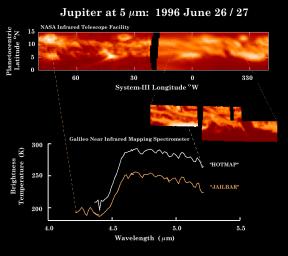
|
Observations of Jupiter’s thermal emission made by the Infrared Telescope Facility and the Galileo NIMS instrument
- Click the image above for a larger view
- Full-Res JPEG (900 x 800) (72.5 kB)
- Full-Res TIFF (900 x 800) (100.3 kB)
Caption:
These observations of Jupiter's equator in thermal (heat) emission were made by NASA's Infrared Telescope Facility (top panel) within hours of the Near-Infrared Mapping Spectrometer (NIMS) instrument image (middle inset) and the spectra (bottom). The "JAILBAR" spectrum is the warmest of 4 spectra taken near the warm spot indicated by the orange dotted line on the left, and the "HOTMAP" spectrum is taken from the brightest region indicated in the inset (corresponding to the bright feature at 0 degrees longitude in the top panel. The NASA IRTF map was made from images taken at a wavelength of 4.85 microns - a part of Jupiter's spectrum which is very transparent. The bright "5 micron hot spots" are areas allowing us to see to depths corresponding to 4 - 8 bars of pressure in Jupiter's atmosphere. The JAILBAR spectrum is consistent with Galileo probe abundances for water - only 10 - 20% of what was expected if Jupiter had formed with the same composition as the sun. These relatively dry conditions may exist only in these bright spots. The JAILBAR region is a "warm spot" which is sufficiently clear of clouds that we can sense atmospheric depths far enough to detect temperatures as high as 255 Kelvins, or 0 degrees F. However, the HOTMAP spectrum, shows water abundances which are even ten times drier than this, with temperatures so clear that we can sense down to levels where the temperatures are 293 K, or 68 deg. F. This is the first detection of regions this hot, and is a result of the high spatial resolution of the NIMS instrument at Jupiter.
The IRTF map was made by Brendan Fisher and Glenn Orton (JPL), Kartik Parija (Drake Univ.), Jose Luis Ortiz (JPL / Instituto de Astrofisica de Andalucia) and Milena Marinova (Caltech).
Background Info:
The Jet Propulsion Laboratory, Pasadena, CA manages the mission for NASA's Office of Space Science, Washington, DC.
This image and other images and data received from Galileo are posted on the World Wide Web, on the Galileo mission home page at URL http://galileo.jpl.nasa.gov .
Cataloging Keywords:
| Name | Value | Additional Values |
|---|---|---|
| Target | Jupiter | |
| System | Jupiter | |
| Target Type | Planet | |
| Mission | Galileo | |
| Instrument Host | Galileo Orbiter | |
| Host Type | Orbiter | |
| Instrument | Near-Infrared Mapping Spectrometer (NIMS) | |
| Detector | ||
| Extra Keywords | Atmosphere, Color, Infrared, Map, Thermal, Water | |
| Acquisition Date | ||
| Release Date | 1998-03-26 | |
| Date in Caption | ||
| Image Credit | NASA/JPL | |
| Source | photojournal.jpl.nasa.gov/catalog/PIA00842 | |
| Identifier | PIA00842 | |
